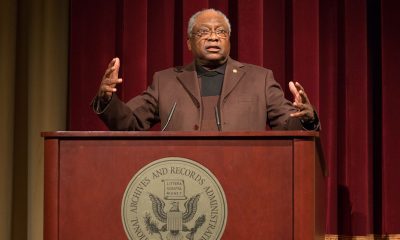Politics
Obama’s Record Budget: Tax the Rich, Help Middle Class

ANDREW TAYLOR, Associated Press
WASHINGTON (AP) — Promising to help America’s middle class, President Barack Obama on Monday sent Congress a record $4 trillion budget that would hammer corporate profits overseas and raise taxes on the wealthy while boosting tax credits for families and the working poor.
Obama’s budget also would steer hundreds of billions of dollars to the nation’s crumbling infrastructure of roads and bridges, help provide two years of free community college and reverse the across-the-board, automatic budget cuts that have slammed the Pentagon and nearly every government department.
In the face of certain opposition from Republicans, an optimistic Obama hailed a “breakthrough year for America” of new jobs, lower unemployment and shrinking deficits after the great recession of 2008, and he called for moving past years of “mindless austerity.” The blueprint for the 2016 budget year that begins Oct. 1 represents a 6.4 percent increase over estimated spending this year, projecting that the deficit will decline to $474 billion.
However, Obama’s plan ignores the new balance of power in Washington, with Republicans running both the House and Senate. The GOP found plenty to criticize in his proposed tax hikes that would total about $1.5 trillion.
Republicans cited the nation’s $18 trillion debt and assailed what they call Obama’s tax-and-spend policies for failing to address the spiraling growth of benefit programs such as Social Security and Medicare.
“Today President Obama laid out a plan for more taxes, more spending, and more of the Washington gridlock that has failed middle class families,” said House Speaker John Boehner, R-Ohio. “This plan never balances — ever.”
Republicans aren’t offering specifics yet but will respond this spring with their own plan, a balanced-budget outline promising to get rid of “Obamacare,” ease the burdens of the national debt on future generations, curb the explosive growth of expensive benefit programs and reform a loophole-cluttered tax code in hopes of promoting economic growth.
While Obama’s plan was rejected out of hand on budget day, proposals to ease automatic cuts and boost transportation funding are likely to return later in the year and require extensive negotiation.
“These proposals are practical, not partisan,” Obama said of his overall plans. “They’ll help working families feel more secure with paychecks that go further, help American workers upgrade their skills so they can compete for higher-paying jobs, and help create the conditions for our businesses to keep generating good new jobs for our workers to fill.”
Some people would pay more. Many wealthy Americans would only be able to take tax deductions at a 28 percent rate even though their incomes were taxed at 39.6 percent, and some would also see an increase in their maximum capital gains rate.
However, a couple earning up to $120,000 a year would qualify for a new “second earner” tax credit of up to $500 as well as a maximum $3,000 per-child tax credit for child care for up to two children, triple the current credit of $1,000.
Obama’s initiatives to tax the wealthy and to welcome an influx of immigrants into the United States are going nowhere in the new GOP-run Congress.
But there is a bipartisan desire to ease automatic spending cuts that are the product of Washington’s failures to cut deficits beyond an initial round in 2011. Both Republicans and Democrats are howling that such broad cuts savage the Pentagon. Obama said he won’t give more money to the Pentagon without receiving domestic funds he wants.
“It would be bad for our security and bad for our growth,” Obama said Monday at the Department of Homeland Security.
The centerpiece of the president’s tax plan is an increase in the capital gains rate on couples making more than $500,000 per year. The rate would climb from 24.2 percent to the Reagan-era top rate of 28 percent. Obama also wants to require estates to pay capital gains taxes that reflect the increase in value of assets like homes and stocks prior to death instead of after inheritance. And he is trying to impose a 0.07 percent fee on the roughly 100 U.S. financial companies with assets of more than $50 billion, raising $112 billion over 10 years.
All told, Obama proposes higher receipts of about $2 trillion though his budget: about $1.5 trillion from tax increases and almost $500 billion from fresh revenue as immigration reform lifts the economy and provides new workers.
His proposals would boost federal spending by $74 billion — divided between the military and domestic programs — and would result in a spending increase of $362 billion over the remaining six years the spending caps were to have been in place.
The deficit would remain under $500 billion a year through 2018, but would rise to $687 billion by 2025, according to administration projections — though levels of red ink could still be considered manageable when measured against the size of the economy.
But the cost of financing the government’s debt would spiral as the debt grows to more than $25 trillion by 2025 and interest rates rise. According to the projections. Interest costs would jump from $229 billion this year to $785 billion in 2025.
A principal theme this year is infrastructure — the budget books’ cover photo is the deteriorating Tappan Zee bridge over the Hudson River — and the plan includes a six-year, $478 billion transportation and infrastructure plan. Gasoline tax revenues would cover only half the cost, so Obama proposes a 14 percent tax on overseas corporate profits to bring in $238 billion. The combination would permit about a one-third increase in spending, with transit programs being the biggest winners.
Obama’s plan contains a lengthy roster of proposals that have been repeatedly rejected by lawmakers: $600 billion in additional revenue over a decade by limiting tax deductions for upper bracket earners; $95 billion from nearly doubling the cigarette tax to $1.95 a pack, and $35 billion through a minimum 30 percent tax rate on million-dollar incomes.
He wants to increase the security fee paid on air travel from $5.60 to $7.50 per one-way ticket. And there’s a new 10-year, $2.5 billion proposal to limit the deductibility of gifts that boosters of college teams give to earn the right to buy basketball and football tickets.
The White House claims $1.8 trillion in deficit savings over 10 years but does so by taking liberties such as ignoring the cost of preventing Medicare cuts to doctors’ fees and extending refundable tax credits for the working poor and couples with children that expire in 2017.
___
Associated Press writers Martin Crutsinger and Jim Kuhnhenn contributed to this report.
Copyright 2015 The Associated Press. All rights reserved. This material may not be published, broadcast, rewritten or redistributed.
Activism
Oakland Post: Week of April 24 – 30, 2024
The printed Weekly Edition of the Oakland Post: Week of April 24 – 30, 2024

To enlarge your view of this issue, use the slider, magnifying glass icon or full page icon in the lower right corner of the browser window. ![]()
Bay Area
MAYOR BREED ANNOUNCES $53 MILLION FEDERAL GRANT FOR SAN FRANCISCO’S HOMELESS PROGRAMS
San Francisco, CA – Mayor London N. Breed today announced that the U.S. Department of Housing and Urban Development (HUD) has awarded the city a $53.7 million grant to support efforts to renew and expand critical services and housing for people experiencing homelessness in San Francisco.

FOR IMMEDIATE RELEASE:
Wednesday, January 31, 2024
Contact: Mayor’s Office of Communications, mayorspressoffice@sfgov.org
***PRESS RELEASE***
MAYOR BREED ANNOUNCES $53 MILLION FEDERAL GRANT FOR SAN FRANCISCO’S HOMELESS PROGRAMS
HUD’s Continuum of Care grant will support the City’s range of critical services and programs, including permanent supportive housing, rapid re-housing, and improved access to housing for survivors of domestic violence
San Francisco, CA – Mayor London N. Breed today announced that the U.S. Department of Housing and Urban Development (HUD) has awarded the city a $53.7 million grant to support efforts to renew and expand critical services and housing for people experiencing homelessness in San Francisco.
HUD’s Continuum of Care (CoC) program is designed to support local programs with the goal of ending homelessness for individuals, families, and Transitional Age Youth.
This funding supports the city’s ongoing efforts that have helped more than 15,000 people exit homelessness since 2018 through City programs including direct housing placements and relocation assistance. During that time San Francisco has also increased housing slots by 50%. San Francisco has the most permanent supportive housing of any county in the Bay Area, and the second most slots per capita than any city in the country.
“In San Francisco, we have worked aggressively to increase housing, shelter, and services for people experiencing homelessness, and we are building on these efforts every day,” said Mayor London Breed. “Every day our encampment outreach workers are going out to bring people indoors and our City workers are connecting people to housing and shelter. This support from the federal government is critical and will allow us to serve people in need and address encampments in our neighborhoods.”
The funding towards supporting the renewal projects in San Francisco include financial support for a mix of permanent supportive housing, rapid re-housing, and transitional housing projects. In addition, the CoC award will support Coordinated Entry projects to centralize the City’s various efforts to address homelessness. This includes $2.1 million in funding for the Coordinated Entry system to improve access to housing for youth and survivors of domestic violence.
“This is a good day for San Francisco,” said Shireen McSpadden, executive director of the Department of Homelessness and Supportive Housing. “HUD’s Continuum of Care funding provides vital resources to a diversity of programs and projects that have helped people to stabilize in our community. This funding is a testament to our work and the work of our nonprofit partners.”
The 2024 Continuum of Care Renewal Awards Include:
- $42.2 million for 29 renewal PSH projects that serve chronically homeless, veterans, and youth
- $318,000 for one new PSH project, which will provide 98 affordable homes for low-income seniors in the Richmond District
- $445,00 for one Transitional Housing (TH) project serving youth
- $6.4 million dedicated to four Rapid Rehousing (RRH) projects that serve families, youth, and survivors of domestic violence
- $750,00 for two Homeless Management Information System (HMIS) projects
- $2.1 million for three Coordinated Entry projects that serve families, youth, chronically homeless, and survivors of domestic violence
In addition, the 2023 CoC Planning Grant, now increased to $1,500,000 from $1,250,000, was also approved. Planning grants are submitted non-competitively and may be used to carry out the duties of operating a CoC, such as system evaluation and planning, monitoring, project and system performance improvement, providing trainings, partner collaborations, and conducting the PIT Count.
“We are very appreciative of HUD’s support in fulfilling our funding request for these critically important projects for San Francisco that help so many people trying to exit homelessness,” said Del Seymour, co-chair of the Local Homeless Coordinating Board. “This funding will make a real difference to people seeking services and support in their journey out of homelessness.”
In comparison to last year’s competition, this represents a $770,000 increase in funding, due to a new PSH project that was funded, an increase in some unit type Fair Market Rents (FMRs) and the larger CoC Planning Grant. In a year where more projects had to compete nationally against other communities, this represents a significant increase.
Nationally, HUD awarded nearly $3.16 billion for over 7,000 local homeless housing and service programs including new projects and renewals across the United States.
Activism
Oakland Post: Week of April 17 – 23, 2024
The printed Weekly Edition of the Oakland Post: Week of April 17 – 23, 2024

To enlarge your view of this issue, use the slider, magnifying glass icon or full page icon in the lower right corner of the browser window. ![]()
-

 Activism4 weeks ago
Activism4 weeks agoOakland Post: Week of March 27 – April 2, 2024
-

 #NNPA BlackPress4 weeks ago
#NNPA BlackPress4 weeks agoCOMMENTARY: D.C. Crime Bill Fails to Address Root Causes of Violence and Incarceration
-

 #NNPA BlackPress4 weeks ago
#NNPA BlackPress4 weeks agoMayor, City Council President React to May 31 Closing of Birmingham-Southern College
-

 #NNPA BlackPress4 weeks ago
#NNPA BlackPress4 weeks agoBeloved Actor and Activist Louis Cameron Gossett Jr. Dies at 87
-

 Community1 week ago
Community1 week agoFinancial Assistance Bill for Descendants of Enslaved Persons to Help Them Purchase, Own, or Maintain a Home
-

 Activism3 weeks ago
Activism3 weeks agoOakland Post: Week of April 3 – 6, 2024
-

 Business1 week ago
Business1 week agoV.P. Kamala Harris: Americans With Criminal Records Will Soon Be Eligible for SBA Loans
-

 Activism2 weeks ago
Activism2 weeks agoOakland Post: Week of April 10 – 16, 2024























































